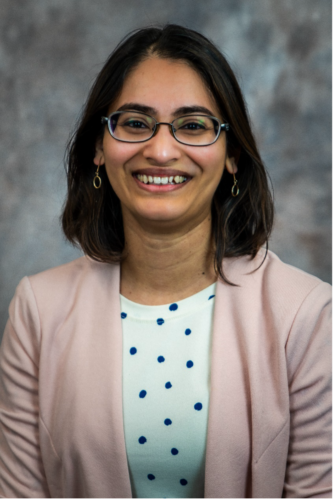Meet Dr. Arunika Das
Written by Dr. Kamilah Grant and Dr. Dawit Tesfaye (SSR Diversity Committee) in honor of Asian American and Pacific Islander Heritage (AAPIH) Month
May is Asian American and Pacific Islander Heritage (AAPIH) month. The SSR Diversity Committee is participating in this celebration. For this, Dr. Kamilah Grant and Dr. Dawit Tesfaye (members of the SSR Diversity Committee) interviewed Dr. Arunika Das from Cornell University. Enjoy the reading.

What is your current position, and what does it entail?
I am currently an NIH FIRST Assistant Professor at Department of Biomedical Sciences, Cornell University. My appointment is primarily research oriented with some teaching and service. I mentor trainees across all levels (undergraduate, graduate and postdoctoral) on various research projects, teach as and when required, and serve in several leadership and/or decision-making roles for the University and beyond. As Faculty in the NIH FIRST program (Faculty Institutional Recruitment for Sustainable Transformation) I am also committed to the goals of the program of building a self-reinforcing community based on advancing diversity sustainably through promoting inclusive excellence.
Can you talk a little bit about yourself, where are you from? What first attracted you to the world of science? And how did you get to be in your current position?
I studied Chemistry as an undergraduate at the University of Calcutta, India, and that’s when I first became interested in unanswered questions in science. I transitioned to a Master’s program in Biochemistry, also at the University of Calcutta, and discovered my love for biological systems. I then pursued a Graduate program in Cell and Developmental Biology at Rutgers University exploring unique ways in which reproduction differed from all other biological phenomenon.
During my postdoctoral tenure, I took a course “Frontiers of Reproduction (FiR)” that further inspired my interest in studying challenges to protein inheritance through reproductive processes. I have always been passionate about supporting women’s health studies and studying challenges to epigenetic inheritance presented by advanced maternal age in the female germline resonated with my personal goals.
Ultimately, I joined Cornell University as it has a rich history in reproductive research, especially for large animal species. Cornell Vet provided a unique opportunity to study other mammalian systems such as equids, which opens up new avenues of research.
What are you most excited to do this year?
My research program focuses on the inheritance patterns of a histone protein from parent to progeny that designates a chromosomal locus, the centromere, essential for chromosome segregation. So far, the field has focused on epigenetic inheritance of centromeres in cultured somatic cells. However, I am now perfectly poised to answer how a protein mark is preserved through the unique challenges presented by both gametogenesis and embryo development.
My work represents the first usage of multiple in vivo mammalian models to answer outstanding questions in centromere biology: how do centromere histones survive epigenetic reprogramming in embryos? How do these nucleosomes evade age associated decay in mammalian eggs while other proteins age? This is an exciting time as we finally have the tools to begin answering these questions with combined insights from both murine and equine systems.
Are there ways in which you think your heritage has affected your perspective or career trajectory?
Originally, my trajectory was to pursue graduate work in Chemistry. However, women are sorely under-represented in the physical sciences in India, and I pursued Biochemistry instead. This was my first exposure to roadblocks in my path to achieving goals. My subsequent scientific training occurred in an environment with limited resources, intense competition, and insufficient support, although my teachers were always encouraging! They urged me to develop skills to innovate with the limited resources on hand, which is valuable for a scientist! I believe I am now well-equipped to handle failures, and challenging conditions that are naturally inherent to all scientific endeavours. In my graduate and postdoctoral training, I received superlative mentoring, support, and resources that ensured my current success and determined my path. My thesis and postdoctoral training mentors recognized possible barriers in my path and guided me to overcome them. In addition, being an immigrant scientist with restricted visits home, essentially isolated me from family support, but provided an impetus to make this journey worthwhile and reinforced my resolve to achieve my goals!
What words of inspiration would you like to share with the future generation of scientists, especially those coming from diverse backgrounds?
Consistency, tenacity and perseverance are required to survive in science. But ultimately, supportive and encouraging mentors who believe in you and promote your career is crucial for success. So, find a great mentor! Being able to creatively rebound from failures, pivot when encountering absolute barriers, while holding on to your dreams are also necessary skills. Keep going, even if conventional routes fail, especially if you are from a diverse background – your presence counts!

